
September
2011
For 11 years now
I've had the pleasure and envy of being friends with a
childhood idol of mine; the guy that wrote the COOLEST
episodes of Spider-Man and his Amazing Friends, Donald F.
Glut. Any comic book fan worth his salt could view an episode
of Amazing Friends and tell that Don was the guy with a wealth
of Marvel Universe research behind him.
|
Q) To give the readers some background on yourself, what
had you been doing preceding working for Marvel
Productions LTD. and what led to you getting work there?
Don Glut: That's a very long story - too long to
go into any great details here. Suffice it to say that I'd
had a number of "careers" before working for
Marvel Productions. I'd been a musician/singer,
copywriter, bookstore clerk (thankfully, for just a very
short time), and actor, but also a writer. Before Marvel
Productions, I'd written for "monster," psychic
phenomena, teen, and movie magazines, among others. And
also for comic books, mostly for Gold Key and Warren, but
for other companies too, including Marvel. At Marvel
Comics, I'd been doing most of my script-writing for my
friend, Roy Thomas. When Roy Thomas moved to Hollywood and
gave up his position at Marvel Comics as editor in chief
(when Jim Shooter
replaced him) a lot of us West Coast
|
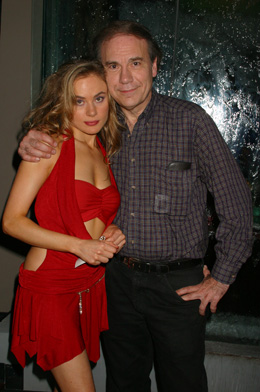 |
|
Don
Glut! |
|
freelancers suddenly found ourselves unemployed. It was a
natural evolutionary step for us to move into TV
animation. Working on the comic books - being trained to
think visually and to work fast - really helped us in
making the transition to animated cartoons. Before working
at Marvel Productions I'd already amassed a good list of
credits working for other animation studios, like
Filmation and Hanna-Barbera. When I found out that Marvel
was starting up its on animation studio, I just phoned
them, told them who I was and what I had done and could do
… and that was that.
Q) For Spider-Man and his
Amazing Friends, you wrote four episodes in the first season and
an uncredited re-write on "The Prison Plot". What was
the process for choosing which episodes you got and how many you
got to write?
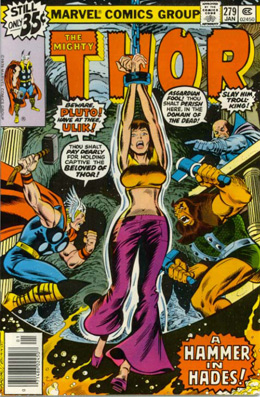 |
|
One of
Don's many comics |
|
Don Glut: It was really kind of a race with all the
writers competing to get their ideas heard first and then get a
positive response. You pitched a basic idea to story editor Dennis
Marks. If he liked it, he hired you to write an outline. If he
(and I think also the network and network censor) approved the
outline, then he'd hire you to write the script. The outlines were
really the hard part, because that's where you had to break down
your plot scene by scene. Writing the script was basically filling
in the blanks - and you got paid a lot more for a script than an
outline. Almost all of my scripts were generated by me, and I kept
pitching cross-overs (because I liked them) with other Marvel
characters (e.g., Captain America, Kazar, Thor, the Black Knight,
Sub-Mariner, etc.). I think there were only two plots that Marvel
gave to me. One was "Along Came a Spider-Man." They
wanted me to write the origin story - and it took so long to get
the censor's approval of letting Uncle Ben die that I lost out on writing |
a lot more episodes, not to mention getting on the Hulk
series. "The Prison Plot" was literally dumped on me.
The thing was a real mess and I was brought in to "fix"
it. Needless to say, it's the least favorite of the episodes I
worked on. As to how many we got to write? As many as we could get
before all the slots were filled by other writers.
Q) Since you were a comic book
fan growing up, what was your opinion at the time to be writing
superhero cartoons instead of comic books (specifically related to
the 'Broadcast Standards and Practices')? Were the standards so
strict that you felt like the cartoons weren't doing the
characters justice?
Don Glut: I never felt I was writing those shows for the
kids. I was really writing them to please the censor - i.e.,
BS&P - and later, with shows like Transformers and G.I. Joe,
to please the toy companies. Yes, it was frustrating. But the
money was a lot better than what the comic books were paying, and
the scripts were easier (for me, anyway) to write. Also, there was
the caveat of the TV cartoons maybe leading to yet bigger and
better things, like movies.
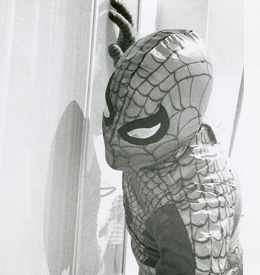 |
|
Don's Spider-Man film
|
|
Q) I’ve
always thought that BS&P was the reason you once mentioned
that you preferred your work on the 1981 syndicated Spider-Man cartoon
than what you did on Spider-Man and his Amazing Friends.
Don Glut: Correct.
With the syndicated Spider-Man series – which was done to
add more episodes to the old 1960's series, so that series would
be more saleable in reruns – we didn’t have the
censorship/BS&P situation we did with the network Amazing
Friends series. Of course, we couldn’t go “too far,” but
I did get away with having a Nazi villain and, if memory serves me
correctly, we may also have been allowed to show guns.
|
Q) In your stories for Amazing
Friends, it almost seemed as if you avoided contradicting the
syndicated Spider-Man show so that Amazing Friends
would work WITH it, which is something other writers did not. Was
this a conscious decision on your part?
Don Glut: You're probably right. I was very much into
"continuity" at the time. At the very least, I was doing
my best to make the characters and stories as true to the comic
books as the story editor would let me. As to the other writers,
well, not all of them - including Dennis Marks - knew or cared
about the comics. Some of them were basically just animation
writers, which accounts for some of their rather odd choices
(e.g., Dracula and not the Marvel Comics version of that
character) for villains and stories.
Q) I got to have a few conversations with Dennis Marks, the story
editor, before he passed away. Dennis was quite candid that he had
no knowledge of the Marvel characters and, in my opinion, he
didn't seem to think that knowledge was too important. But,
obviously, Dennis liked a lot of your "Marvel saturated"
outlines. What was the relationship like between you two? The nine
year old in me wants to think that you two had sword fights over
the correct use of the Marvel characters but the adult in me wants
to know how it was to deal with a boss in a situation where you
KNOW you're right.
Don Glut: Right, Dennis was one of
those strictly animation writers and a real veteran. I had no real
conflict with Dennis. We worked very well together and he seemed
to like it – as certainly did Stan Lee, who was almost always
present at the studio – when I brought in all that Marvel lore.
But almost always I had to explain to Dennis who these characters
were – Namor, Black Knight, etc., although I think he did know
who Captain America was. I always figured that the kids watching
the show would also be reading the comic books. It seemed to me
that TV shows and movies based on comic-book heroes were always
more successful when they stayed “true” to their source
material, such as the new Spider-Man, Fantastic Four and
X-Men movies, and the Christopher Reeve and George Reeves
movies and TV show, respectively, as opposed to some of those
revamped Dr. Strange, Captain America and Wonder
Woman efforts we got back in the 1970s. (I was amazed that Smallville
was so popular on TV, because it bears so little resemblance to
the Superman mythos.)
Q) I think you hit the nail on the head. These shows were the
gateway to new comic book fans at the time. I can't begin to tell
you how many people have told me that Amazing Friends was
what got them into comic books. So in pitching your outlines, I
assume that you used Marvel characters that you were fond of that
coincided with stories ideas that grabbed you.
Don Glut: That is indeed correct. That goes for the
villains as well as the heroes. Kraven the Hunter was always a
favorite of mine, which is why I used him in both of the
Spider-Man series I wrote for. And, of course, I've always been
partial to Cap.
Q) How did the idea for the Black Knight episode ("Knights
and Demons") come about? Since the Marvel Comics version of
the character was not used, I assume the end result was quite
different from what you proposed.
Don Glut: Really glad you asked that question - because,
until now, I don't remember anyone ever asking me before. I'd
always liked the Black Knight, especially the 1950's Atlas version
of the character. My original story outline included both Black
Knights …a flashback to Medieval times with the first BK, then
the main body of the story featuring his modern-day counterpart.
Dennis, who you remember was not a "Marvelite," thought
having two Black Knights, and then having to explain why there
were two, would be too confusing and would take away some screen
time better spent (in his opinion) on action. He didn't understand
why I wanted to have both characters and didn't believe the
viewers would
|
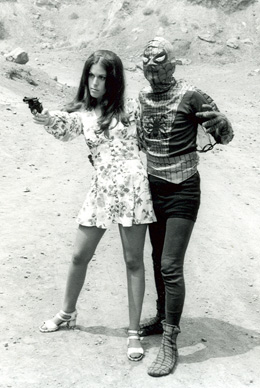 |
|
Don's Spider-Man
film |
|
care. So, upon Dennis' insistence, I had to combine
the two characters, which kind of resulted in the creation of a
third having attributes of both.
Q) Instead
of using a Marvel Comics villain, you used Video-man as the
antagonist in the episode "The Origin of the Iceman".
What was your original proposal and how did Video-man end up in
the final version?
Don Glut:
Arrgghhh! Another sore spot (the sorest being "The Prison
Plot"). Video-man was literally foisted upon me. Dennis -
again, not a Marvel Comics fan - really liked the Video-man
character (as he really liked that embarrassing Ms. Lion pooch,
which was his creation, pride and joy), who was, let's face it,
your typical Saturday-morning-type bad guy. Dennis wanted to
feature Video-man in another episode, but also wanted to do an
Iceman origin. Both got dumped on me and, well, one has to make a
living.
Q) Looking back on
Amazing Friends after all of these years, it showcased the Marvel
Universe very well. (You, almost alone, expanded the solo
Spider-Man cartoon to include other Marvel Universe heroes.) These
two cartoons showcased the Marvel Universe better than what a lot
of cartoons these days are able to do because the character rights
are being sold off to different studios. That said, it is still
surprising that the first family of the Marvel Universe never made
an appearance on either Spider-Man cartoon. Did you have any
fondness for the Fantastic Four?
Don
Glut: Yes, I loved
the FF, especially in the old Lee and Kirby days. I don't recall
why I never used them. Possibly the rights were still tied up with
Depatie-Freleng (which really became Marvel Productions). Or maybe
Stan or someone at Marvel was holding back on the FF - maybe they
were too important a franchise to "waste" doing a guest
shot on a Spider-Man show.
Q) In the episode
"Pawns of the Kingpin" you batted a triple into the
Marvel Universe with Captain America, the Kingpin and Dr. Faustus.
In the comic books, Dr. Faustus was a fat man with red-hair and a
red beard and mustache. But in the show he was a slim, balding man
with a grey beard and mustache. He looked similar to Dennis Marks,
who did the voice for the character. I asked the show's character
designer, Rick Hoberg, if this was intentional but Rick didn't
remember the character or if Dennis had anything to do with the
changed visual appearance (which is understandable after 30 years)…but
he said he wouldn't put it past Dennis' doing. Any memory of it?
Don
Glut: No, I have no memory
of why the change was made. In fact, I didn't even remember that
there was a change. It's been a long time since I saw that
episode! But the revamped Dr. Faustus didn't look much to me like
Dennis. Who did look (and sound) to me like Dennis was that
recurring villain [Gargamel] on THE SMURFS. Possibly Dennis
changed the look so that the episode wouldn't feature two heavyset
villains, which might have been confusing to the kids watching the
show, visually at least. But I really can't say for sure.
Q) You wrote a lot
of cartoon episodes throughout the 70's and 80's including Scooby
Doo, He-Man, Transformers even Monchhichis. Did you have a
particular favorite type of cartoon that you like to write?
Don
Glut: To be honest, I
didn't really have a favorite. They were just jobs to me, written
to please the network censors and the toy company sponsors. I
never much enjoyed writing TV animation, because we really weren't
allowed to write our best. There were just too many restrictions.
At least that's my opinion. A lot of animation writers I've spoken
too really consider the scripts they wrote for TV fine pieces of
work. That's their opinion. I take pride in very, very few of the
TV cartoon scripts that I wrote, one of them being the
"Rumble in Old Detroit" episode I wrote for Robocop,
which was produced by Marvel Productions … another, my
"Duck in the Iron Mask" for Ducktales. I had a lot more
creative freedom on both of those shows.
Q) At the time of
the show, how knowledgeable were you of the, then, current
Spider-Man comics? A few characters that went on to be a large
part of the Spider-Man canon were introduced around the time the
show was airing, such as the alien "black costume", and
the Hobgoblin. Were you keeping up with comic book at the time…or
since? If so, did you ever consider using those characters on Amazing
Friends?
Don
Glut: Yes, I was familiar
with those new characters back then. (I stopped reading the comics
shortly after they went to the slick-paper format.) No, I don't
think I ever considered using either of those characters for the
TV show. I never really cared for either, really, so using them
probably never entered my mind.
|
|
Q) In hindsight, I
think my two personal biggest disappointments about the shows are
that you only wrote one script for the third season of Amazing
Friends ("Origin of the Spider-Friends") AND that
you missed out entirely on the Hulk cartoon, which was in
desperate need of more connection to the Marvel Universe. How
familiar were you with the Hulk's villains? Are there any
particular ones you would have favored?
Don Glut:
At the time, I was following all of the various Hulk comics. I'm a
big-time Frankenstein buff and the Hulk reminded me of the
Frankenstein Monster. I think the main reason I didn't get on the
Hulk cartoon series or do more Spider-Friends episodes was because
I'd gotten hung up time-wise doing that origin of Spider-Man
script, mainly because the network censors didn't want to have a
death (Uncle Ben's) on a Saturday-morning kids show, and Stan
remained adamant that without Ben's death there
could be |
no origin
story. That dragged on for a very long time. Meanwhile, Dennis -
for reasons only known to him - kept me in a kind of limbo, unable
to accept other Marvel Productions assignments, until the origin's
death issue was resolved. I think he wanted me "ready to
roll" as soon as we got network approval on the origin. I
lost a lot of work at Marvel, which was about the time of my
divorce and when I desperately needed the income. So all the
scripts for Hulk and additional Spider-Friends scripts went to
other writers … while I sat around waiting for the network to
okay (or kill) the Spidey origin story and Dennis to give me the
go-ahead. Had I been able to get a script assignment on the HULK
show, I'd probably have used the Rhino, Abomination or Absorbing
Man, maybe the Leader or even Marvel's version of the Frankenstein
Monster. But I'd also have liked to take the Hulk to Kazar's
Savage Land and fight some dinosaurs … or (and I think I
seriously thought about this at the time) one of those early 1960s
Atlas giant monsters, particularly my favorite, Gorgilla … but
maybe even that hairy creature originally called the Hulk.
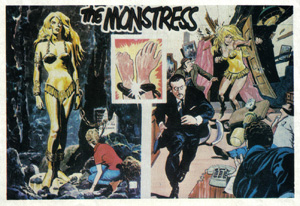 |
Q) Were you
involved at all in Marvel Productions' attempts to get other
Marvel Comics based series off the ground at the time such as the
proposed Iron Man, Ant-Man, Daredevil and Secret Wars series?
Don Glut:
No. In fact, this is the first I've heard of such proposals. Stan
did, around that time, assign me to come up with an origin and
back-up story for |
a female character he called THE MONSTRESS, but the idea never
went beyond what I wrote and maybe a few drawings.
Q) Was Stan Lee or
anyone else at Marvel Productions aware of your amateur films
featuring Marvel characters, including the very first live-action
production of Spider-Man?
Don Glut:
I don't know or remember. I did, however, show Stan my Spider-Man
costume when I met him for the first time in New York around 1966.
That was a few years before I would make my Spider-Man amateur
movie. I'd had the naďve idea that I could get - for free - the
rights to film a Spider-Man TV pilot. Stan graciously explained to
me how that was impossible. Never did I realize, at that time,
that someday I'd be working for Stan writing the character's
animated adventures.
Q) How much of an
active role did Stan have with you and the other writers in the
early Marvel Productions series? Did he ever offer suggestions or
ideas for any of the episodes?
Don Glut:
I remember Stan's direct involvement being minimal. It was really Dennis' ballgame and he threw a lot of weight,
because of his experience in writing Saturday morning cartoons and
also because (I think) he won an Emmy or some other prestigious
award for some kids' show he'd produced. I think Stan was more of
a figurehead at Marvel Productions, at least in those days. I came
up with an idea to make him a character - who I called "Stan
on the Street" - who would appear in every animated episode
with Stan doing his own voice. But Dennis nixed that idea because
of union rules and other problems.
Q) You once
mentioned to me that the story editor, Dennis Marks, explained to
you that humor was to be prevalent in Spider-Man and his Amazing
Friends. Spider-Man was to be Bing Crosby and Iceman was to be Bob
Hope, in homage to the Road pictures. I know the
"friends" concept was created because Super Friends had
been a success. But, besides the animal sidekicks, humor wasn't at
the forefront in that cartoon. Do you have any idea why Dennis
wanted humor to be the basis on Amazing Friends?
Don
Glut: You are correct about
the Crosby-Hope connection. Dennis told me flat out that Amazing
Friends was "a comedy show" and we were playing the show
for laughs. Why? Dennis liked comedy, but not necessarily
"serious" super-heroes. Comedy was Dennis' background.
Q) Both you and
Dennis Marks had mentioned to me that you later had trouble
getting work in cartoons because of your age. How do you think
Hollywood has allowed this logic to come about?
Don Glut:
They say age 33 or so is the point where Hollywood doesn't want
you anymore. For that reason, some writers actually use
"fronts" like they did during the early 1950s, but for a
different reason. I believe the studios want everyone working for
them - from the producers down to the person running the Xerox
machines - to project youth, vigor and good looks, regardless of
their qualifications. Walk into any mainstream movie or TV studio
or production company building and you'll find it filled with
good-looking, youngish people. You don't see a lot of
"characters," people who are really overweight, with
major acne, etc. It's largely a cosmetic industry where how you
look is often more important than what you can do or did in the
past. It's a sorry situation. A lot of really talented and
reliable people can't get work anymore because of their age.
Q) What have you
been working on since your cartoon work?
Don
Glut: For the most part,
and aside from some music (I'm still a musician and song writer),
I've basically been restricting my workload to making low-budget
campy, sexy horror movies through my company Frontline
Entertainment and writing more
supplements in my Dinosaurs: The Encyclopedia series of
semi-technical reference books. But I have a lot more fun making
the movies than writing these books. We've done six feature-length
films now and I'm anxious to do number seven. Our last was a
vampire and mummy picture called BLOOD SCARAB, the first of our
movies to get a (limited) theatrical release. Our biggest problem,
however, is getting the money to finance these films. (Any
potential investors out there, please contact me!)
Q) For a fun
sign-off, I want you to totally disregard money and tell me what
you would have loved to do for a living when you were age 10, 20,
40 and now.
|
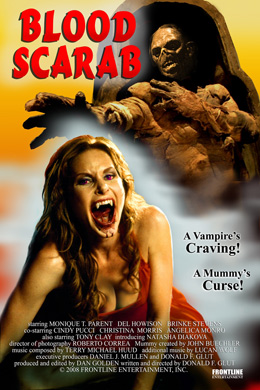 |
Don Glut:
That's your easiest question of all:
10 - cowboy, spaceman or paleontologist
20 - rock star
40 - movie director/writer/producer
Now? Still at the 40 level - and hope to be there until I expire,
sometime between the words "Action!" and
"Cut!"
Keep up with Don at
www.donaldfglut.com
Excelsior!!

|
|